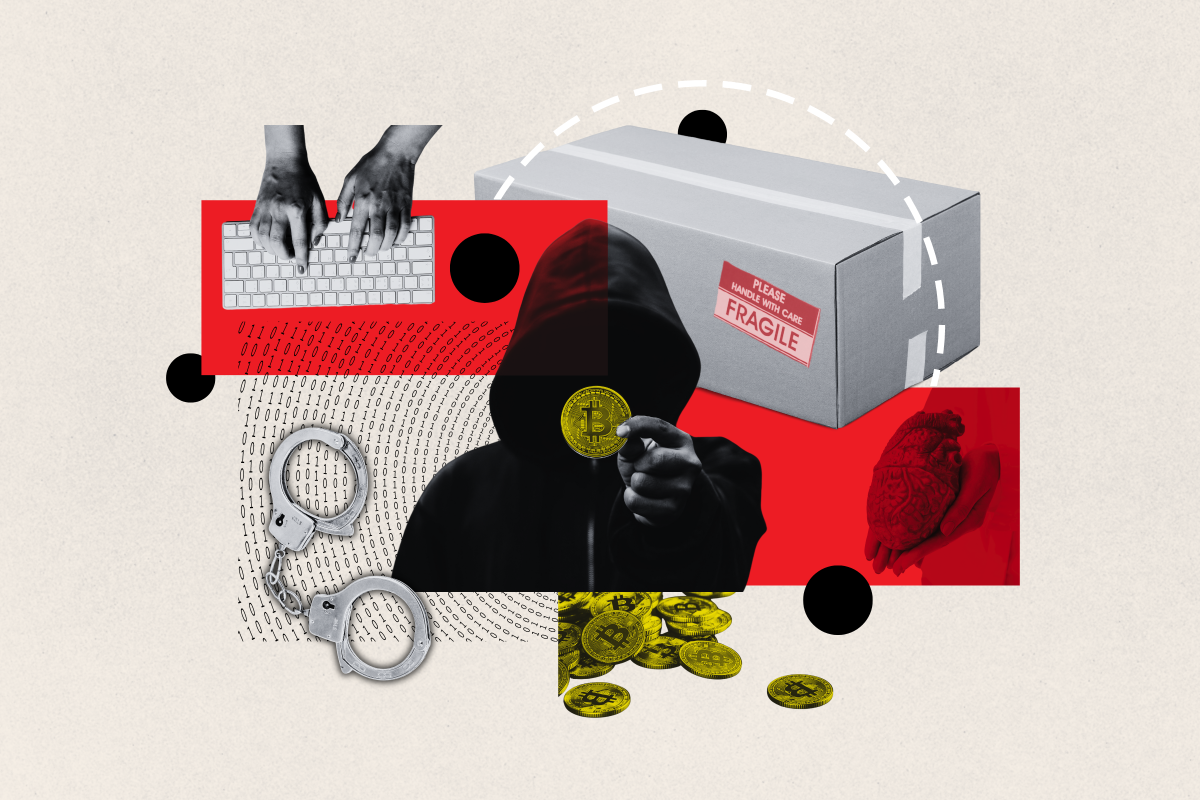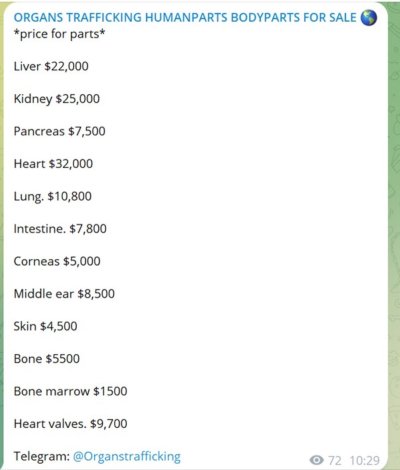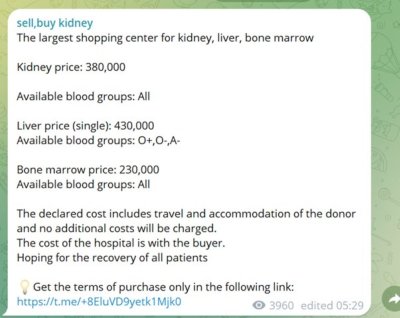Heart valves, skin, corneas, a middle ear: These are just some of the human organs that are being advertised for sale in clandestine social media groups, with potential buyers offered body parts of their choice in exchange for thousands of dollars in cryptocurrency, a Newsweek investigation reveals.
Newsweek has infiltrated groups on the social media platform Telegram, purporting to sell a range of organs from so-called donors in what is a lesser-known human trafficking trend that flouts federal law.
The illicit sale of organs takes place either through trafficking human beings for the intent of organ removal, wherein people are coerced or exploited and trafficked before donating organs, or through organ trafficking—the illegal handling of organs, which includes selling them or advertising an intent to buy or sell them.
According to a U.S. Department of State 2024 Trafficking in Persons Report, kidneys are the most commonly trafficked organ and victims of trafficking, mostly refugee men aged 30, according to the the United Nations Office on Drugs and Crime (UNODC), are often told that their kidneys will grow back or that there will be no side effects to organ donation.
Meanwhile, the UNODC estimates there were around 700 victims of trafficking in persons for the purpose of organ removal between 2008 and 2022 but that the scale of the problem is not known, and is likely to be much larger. In 2018, the World Health Organization (WHO) estimated that 10,000 kidneys are traded annually on the black market.

Photo-illustration by Newsweek/Getty
Underground network of organ sellers
One group Newsweek found called “kidney organ for sale USA” is a forum of people who claim to want to sell or buy organs, using the group as an intermediary.
Mel Luten, who runs the group and claims to be a doctor based in California, told Newsweek that he started his business a year ago to “help those who have been suffering from issues like heart failures or kidney failures.”
He said he’s recruited a team of 20 worldwide surgeons who take donations and oversee transplants from people who pay in cryptocurrency.
“We have a team of professional surgeons who remove and do the transplant in our clinic or overseas,” he told Newsweek over Telegram.
He said that he sold organs with “100 percent discreet packaging and safe shipping worldwide.” He owns machines that can keep organs fresh for a year.
He’s aware that his group is illegal, adding that “we do safe life’s [sic] on a daily basis.”
Screenshots sent to Newsweek by Luten appear to show crypto bank balances of $11 million and $5 million (USD) across two accounts. He provided messages he claimed were from donors and organ recipients he did business with.
Another group appearing to capitalize on this market, uncovered by Newsweek and aptly named “organs trafficking humanparts bodyparts for sale,” instructs interested punters to make payments in Bitcoin to receive organs from a menu boasting an array of options from lungs, priced at $10,800, to bone marrow for $1,500. The group has 1,044 subscribers.

Telegram

Telegram

Telegram
A third group with 781 subscribers called “sell, buy kidney” describes itself as “the largest shopping center for kidney, liver, bone marrow.”
It requests payments via TRC20, cryptocurrency issued by the firm Tether.
A Tether spokesperson told Newsweek: “Unlike fiat, with Tether every action is online, every action is traceable, every asset can be seized, and every criminal can be caught. We work with law enforcement to do exactly that.”
A Telegram spokesperson told Newsweek: “Since its creation, Telegram has actively moderated harmful content on its platform. Telegram moderators use a combination of proactive monitoring of public parts of the platform and user reports in order to remove millions of pieces of content each day that breach Telegram’s terms of service.”
Newsweek also contacted Bitcoin and the Department of Justice through their respective website forms to comment on this story.
The groups mentioned in this story were also contacted for comment, as were five other groups that Newsweek found on Telegram and multiple people who are members of these groups. No attempt at organ purchase was made to verify the veracity of these groups though it is illegal to advertise organs online in the U.S.

Telegram

Telegram
Black market centers on the ‘desperate’
In the U.S., a person who transfers a human organ for use in human transplants may see five years in prison, a $50,000 fine or both.
Those risking incarceration may be buoyed by the potential of financial reward. According to a 2019 article in the American Journal of Biomedical Science & Research, kidneys are sold for $50,000 to $120,000.
A 2017 report by think tank Global Financial Integrity (GFI) estimated that the global illegal organ trade generates $840 million to $1.7 billion annually.
“I don’t know that anything has been done internationally,” GFI President and CEO Tom Cardamone told Newsweek. “It’s primarily an activity of people preying on the desperate—migrants, refugees from war zones. They have no sort of financial wherewithal at all. The most valuable thing they may possess is their organs. Some people get so desperate, they’re willing to sell them.”
He said it also depends on law enforcement agencies, which routinely focus on more pressing priorities like terrorism, narcotics and financial crimes “that are far more prevalent and far more lucrative.”
“When you have limited resources, you try to go at the most severe problems,” he said. “That’s not to say law enforcement is not concerned about this, no doubt they are. But it would take a heck of a lot of effort to try to infiltrate networks that might be involved in this type of trade activity. It comes down to a numbers game.”
A spokesperson for the National Kidney Foundation (U.S.) told Newsweek that there were 21,764 donors in 2023—that includes 15,471 deceased donors and 6,293 living donors. The average wait time for a kidney transplant is three to five years but can be as long as 10 years in some states.
Currently, about 90,000 people are waiting for a kidney transplant though tens or hundreds of thousands more who could potentially benefit from a transplant but never made it to the waitlist. Twelve people die each day waiting for such a transplant, equating to roughly 5,600 annual deaths according to research from the University of Pennsylvania’s Leonard Davis Institute of Health Economics.
Social media, Dark Web aid illicit networks
“I think proving organ trafficking is really tough as most of the time the victims are not willing to cooperate, and to tackle this problem we need to make organ trafficking illegal—which is much easier to investigate,” Silvia Tabusca, a Romanian organized crime expert and coordinator of the Human Security Program at the European Center for Legal Education and Research, told Newsweek.
The demand to purchase organs is accompanied by the demand to sell them.
One member of “kidney organ for sale USA”, who spoke to Newsweek under the condition of anonymity, said he wanted to sell his kidney because he needs money. “When you are dying due to hunger and lenders are threatening then everything is legal,” he said. He said lots of scammers who ask donors for a fee then block them. Newsweek was unable to verify his identity.
Jarrod Sadulski, an associate professor in the School of Security and Global Studies at American Military University and an expert in human trafficking, explained social media’s role in facilitating organ trafficking.
“Social media is the primary way that criminals offer illicit services. Yes, the Dark Web is used to sell organs, but social media is used to both seek out illicit organs that are being sold and to find buyers,” he told Newsweek.
“The problem is that similar to sex trafficking, organ traffickers use a complex way of communicating. They use emojis and terminology that is not detected by law enforcement or social media platforms themselves as organ harvesting. Both the type of emoji and color of the emoji have implications to organ harvesting.”
He cited the example of a red heart being used to indicate someone in need of a heart, while a blue heart can indicate someone selling that organ.
Ramesh Srinivasan, professor of information studies at UCLA and founder of the UC-wide Digital Cultures Lab, said nefarious online sales aren’t new or unique—referencing Dark Web sites like Silk Road that gained traction in the early 2010s and facilitated legal and illegal sales totaling 9,519,664 Bitcoins, according to court documents.
The speed and “greater disorientation” presented by a fast-moving digital world becoming only more convoluted will allow bad actors to proliferate, he added.
“Our online lives will be ones where scams will continue to grow in their importance as a real problem that we have to deal with,” Srinivasan told Newsweek. “And that’s because of the emergence of AI systems; the ability to deploy cryptocurrencies to facilitate different transactions. And, increasingly, that sense that we can’t really trust what we engage with online.
“As it becomes a place where we do commerce activity, where we do almost everything, it’s likely that scams will continue to be more and more prevalent.”
Uncommon Knowledge
Newsweek is committed to challenging conventional wisdom and finding connections in the search for common ground.
Newsweek is committed to challenging conventional wisdom and finding connections in the search for common ground.














